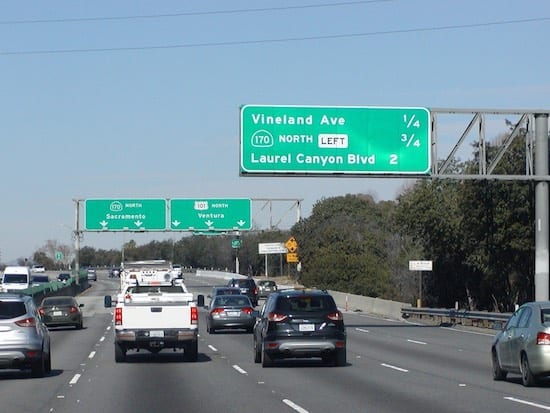The Trump administration formally proposed on Thursday to freeze federal fuel economy standards at 2020 levels, an initiative that is expected to raise costs for consumers and drastically increase pollution levels. Under the plan, the administration also said it will revoke a waiver that allowed California to set its own fuel mileage and emissions standards.
By rolling back the Obama-era standards, the proposal — jointly released by the U.S. Environmental Protection Agency (EPA) and the Department of Transportation — would lead to an increase in air pollutants that are extremely harmful to public health.
The weakening of fuel efficiency standards also is occurring at a time when the transportation sector has overtaken power plants as the largest emitters of carbon dioxide.
Many observers view the proposed rollback of fuel efficiency standards — which are extremely popular with the American public — as a handout to oil companies that are concerned that the existing standards will cut into oil consumption by the transportation sector.
The current standards that the Trump administration is seeking to roll back are projected to reduce carbon emission by 6 billion tons, save consumers $1.7 trillion in fuel costs, and reduce oil consumption by up to 4 million barrels every day.
A recent poll found that nearly seven in 10 American voters want the existing standards to remain in place.
But the Trump administration claims its proposed changes — called the “Safer Affordable Fuel-Efficient (SAFE) Vehicles Rule for Model Years 2021-2026 Passenger Cars and Light Trucks” — will save Americans about $2,000 on every new vehicle purchased and avoid 1,000 road deaths a year over the life of the program.
The administration also contends that people who do not buy new cars for cost reasons will risk injury and death because new model cars will be even safer than the cars currently on the road.
The public will have 60 days to provide feedback on the rollback of fuel efficiency standards and revoking California’s waiver after the proposal is published in the Federal Register.
“Rolling back the Clean Car Standards is one of the most significant attacks on clean air and climate action in history, and, Donald Trump is making it clear his mantra is pollution over everything,” Sierra Club Executive Director Michael Brune said Thursday in a statement.
“The clean car standards and the right of states to protect their residents enjoy overwhelming support and are backed by numerous scientific studies.”
The auto emissions standards were adopted in 2012 with broad support from automakers, labor, and consumers to significantly reduce climate pollution.
Since then, drivers have saved more than $57 billion on gasoline thanks to these standards and have reduced emissions by 228 million metric tons, according to the Union of Concerned Scientists.
Advertisement
By 2030, however, the pollution equivalent of the proposed rollback will be equal to firing up 30 coal power plants, according to Earthjustice.
By 2040, if the Trump rollbacks are put into place, the annual pollution will be the equivalent of 43 coal-fired power plants, the group said.
BREAKING: Trump’s EPA just proposed to gut national clean car standards as well as states’ authority to protect their residents from tailpipe pollution. Trump will face a wave of resistance from states, everyday Americans – and Earthjustice attorneys. https://t.co/cgqlHC0IC6
— Earthjustice (@Earthjustice) August 2, 2018
Petroleum-burning vehicles emit pollution, including particulates, in the atmosphere. When breathed in, this pollution can lodge inside people’s lungs and contribute to heart attacks, strokes, and respiratory diseases. More fuel-efficient vehicles burn less gasoline, adding fewer pollutants to the atmosphere and causing fewer deaths.
“It’s a boon for big oil that ordinary Americans will pay for with their health and their wallets,” Paul Cort, an Earthjustice attorney, said Thursday in a statement.
The Obama administration’s rules, negotiated with automakers in 2011, would double average fleet-wide fuel efficiency by 2025.
From a greenhouse gas emissions perspective, these standards for model years 2022 to 2025 are expected to achieve an industry-wide fleet average of 173 grams of carbon dioxide equivalent per mile in model year 2025, which is projected to be equivalent to 51.4 mpg if the automotive industry meets the target exclusively through fuel economy improvements.
From 2022 to 2025 alone, the Obama rules are projected to reduce U.S. oil consumption by 1.2 billion barrels, cut half a billion metric tons of carbon pollution and save consumers millions of dollars in fuel costs, according to the EPA.
The Trump rollback, however, is projected to increase consumer spending on gasoline by about $20 billion in 2025 and nearly $50 billion by 2035 compared to spending under the current standards, according to analysis by Synapse Energy Economics Inc. and the Union of Concerned Scientists (USC).
Congress started requiring the Transportation Department to set corporate average fuel economy (CAFE) standards to reduce U.S. dependence on foreign oil after the 1973 Arab oil embargo.
In 2007, the Supreme Court, in its Massachusetts v. EPA ruling, forced the EPA to start regulating carbon dioxide and other greenhouse gases because they posed a danger to human health. The agency was required to develop emissions standards for vehicles.
Then this year, in early April, former EPA Administrator Scott Pruitt announced that the EPA had completed a statutorily required evaluation process for the existing federal greenhouse gas emissions standards for cars and light trucks for model years 2022 to 2025 and determined that the standards “are not appropriate and should be revised.”
A lawsuit was filed on May 1 by 17 states and the District of Columbia challenging the EPA determination, published on April 13, which argued that the fuel efficiency requirements for cars and light trucks are too stringent and must be revised.
The proposal issued by the EPA on Tuesday also calls for revoking California’s waiver to set its own emission standards on the grounds that only the Transportation Department can set fuel-economy standards.
Under the 1970 Clean Air Act, California can request a waiver from the federal government to set higher emissions standards for cars and trucks. The waiver was introduced to allow the state to address its severe air pollution.
The state’s most recent waiver was granted in 2013 by President Obama, and it allows California to limit carbon emissions and require automakers to sell a certain number of low-emission and zero-emission vehicles in the state.
“Attempting to revoke California’s greenhouse gas standards runs directly counter to the administration’s professed support for states’ rights, and undermines their ability to help achieve America’s climate pledge,” Dan Lashof, director of World Resources Institute United States, said Thursday in a statement.
Under current rules, other states may choose to adopt California’s vehicle emissions standards without EPA approval. Fifteen states, making up 40 percent of the U.S. auto market, currently follow at least some of California’s vehicle emissions standards, including its fuel economy standards.
Because California’s economy is so large, the state’s stricter fuel efficiency standards have forced automakers to design cars that fit within the state’s standards.
California Attorney General Xavier Becerra said Thursday that the California Department of Justice will “use every legal tool at its disposal” to defend the current national standards. “We are ready to do what is necessary to hold this Administration accountable,” Becerra said in a statement.
Many also predict the administration’s proposal will have a significant impact on the economy. Freezing existing federal fuel economy standards for cars and light trucks at 2020 levels would cost the U.S. economy a total of more than $450 billion through 2050, research group Energy Innovation Policy & Technology LLC wrote in a research report released last week.
In the first few years after freezing fuel economy standards, the rollback would create small financial gains because it is less expensive to build cheaper, less efficient cars, according to Energy Innovation. But the gains from manufacturing cheaper cars would be quickly outweighed by increased fuel expenses that grow each year, as more years of fuel savings are lost.
The increased expenses would add up to $457 billion by 2050. Freezing the standards also would result in an 11 percent increase in transportation emissions by 2035 and 20 percent more gasoline use per year by 2030 compared to if the standards were retained, Energy Innovation found.
Groups also highlighted the impact of the Trump administration’s proposal on jobs. The EPA and Transportation Department themselves estimate that the rollback will result in 60,000 fewer jobs.
“We urge the administration to reconsider this embarrassingly weak and economically harmful proposal. It would cede leadership in critical automotive technology to other nations and disrupt investment and job growth in manufacturing communities across the U.S.,” said Zoe Lipman, director of the BlueGreen Alliance’s Vehicles and Advanced Transportation Program.
This article was originally published on Think Progress. Republished here with permission.







